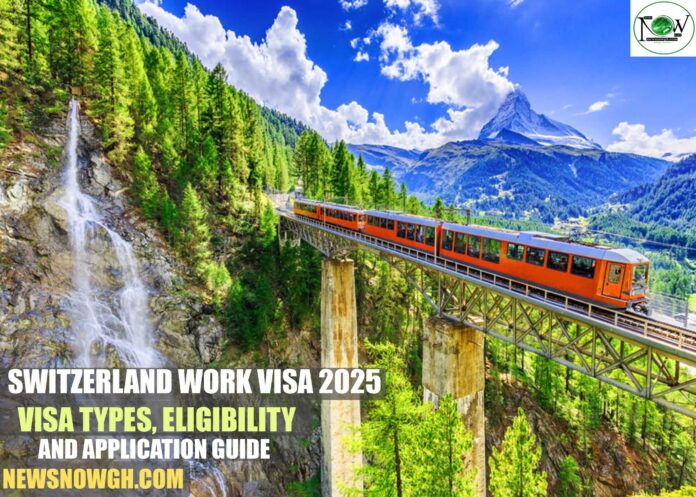Switzerland Work Visa 2025: Visa Types, Eligibility, and Application Guide
Switzerland is a top destination for professionals seeking rewarding careers. With its strong economy, competitive salaries, and excellent working conditions, many individuals flock to Switzerland each year. To navigate the application process effectively, understanding the Switzerland Work Visa requirements in 2025 is essential.
This guide will provide a clear overview of the visa types, eligibility criteria, and the step-by-step application process.
Switzerland Work Visa
A Switzerland work visa serves as a residence permit, allowing foreign nationals to live and work legally in the country. The specific type of visa depends on nationality, employment duration, and the purpose of work. Although Switzerland is part of the Schengen Zone, its work visa regulations are stricter, particularly for non-EU/EEA citizens.
Types of Switzerland Work Visas
Switzerland offers various work visa categories based on nationality, employment type, and contract duration. The main types include:
- Short-Term Work Visa (L Permit): Issued for employment contracts lasting less than a year, this visa is linked to the contract duration.
- Long-Term Work Visa (B Permit): This visa is for foreign workers with contracts lasting over a year. It is renewable but may have employer-specific conditions.
- Cross-Border Commuter Permit (G Permit): Designed for individuals living in neighboring countries like France or Germany but working in Switzerland.
- Settlement Permit (C Permit): After residing and working in Switzerland for a minimum of 10 years (for most non-EU nationals), one can apply for permanent residency.
Eligibility
Not everyone qualifies for a Swiss work visa. Eligibility depends on nationality and employment type, with stricter criteria for non-EU/EEA nationals:
- Job Offer: Applicants must secure a confirmed job offer from a Swiss employer.
- Qualifications: Preference is given to highly skilled professionals, such as managers and specialists with advanced degrees.
- Work Permit Quotas: Switzerland operates a quota system for non-EU workers, limiting the number of permits issued.
- Employer Sponsorship: Employers must demonstrate that they could not find a suitable candidate from Switzerland or the EU.
- Financial Stability: Applicants must show they can support themselves during their stay.
- Clean Criminal Background: Evidence of good conduct and a clean criminal record is required.
Step-by-Step Application Guide for 2025
Follow these steps to apply for a Swiss work visa:
- Secure Employment: Obtain a valid job offer from a Swiss employer. Without this, a work visa cannot be applied for.
- Employer Application: Once the job offer is confirmed, the employer applies to the cantonal immigration office for a work permit.
- Government Review: The canton and federal authorities review the application to ensure compliance with requirements and quotas.
- Visa Application: After approval, apply for the work visa at the Swiss embassy or consulate in your home country. Submit necessary forms and fees, and attend a personal interview if required.
- Wait for Processing: Visa processing typically takes 6 to 12 weeks, depending on nationality and workload at the embassy.
- Travel to Switzerland: Upon approval, you can travel to Switzerland. Register at the Residents Registration Office within 14 days of arrival.
- Receive Residence Permit: After registration, you will receive your residence permit (L, B, or G Permit), allowing you to live and work in Switzerland.
Processing Time
The processing time for Swiss work visas varies by permit type:
- Non-EU Nationals: Typically takes 6 to 12 weeks.
- EU/EEA Nationals: Usually takes 2 to 4 weeks.
Applicants should plan accordingly and start their applications early.
Conclusion
The 2025 work visa process in Switzerland is stringent, particularly for non-EU nationals. High competition and strict regulations mean that only qualified professionals with legitimate job offers have a strong chance of obtaining a work visa.
The process involves multiple steps, including employer sponsorship and government approval, making thorough preparation essential. Embrace the opportunity to work in Switzerland and advance your career in this vibrant country!
Follow NewsNowGh to stay updated on the latest information regarding work permits, visas, and visa-sponsored employment.


